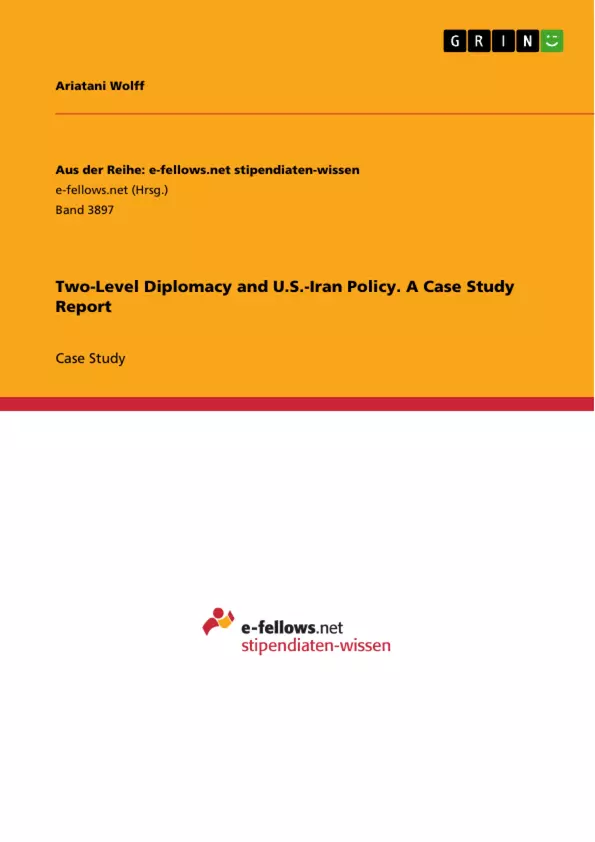In this Case Study Report, the author examines the U.S.-Iran negotiations on a nuclear agreement, which serve as an empirical example of the Two-Level Games model the political scientist Robert Putnam introduced in 1988.
At first, this paper provides a brief overview of the complex relationship between the USA and Iran, Putnam’s Theory and its suitability for this case. Secondly, it introduces the relevant actors, their goals and the respective domestic factors of both countries which had influenced the negotiations that finally led to the Joint Comprehensive Plan of Action (JCPOA) in 2015. Since then president Donald Trump withdrew from this nuclear agreement in 2018, it will examine the chances for a return to the deal/a new deal under the new Biden administration. In a short conclusion, the author sums up the results and comes to a final assessment of the current situation.
Inhaltsverzeichnis (Table of Contents)
- Introduction/Abstract
- (Historical) background, Putnam's model of Two-Level Games and case selection
- Negotiations leading to JCPOA: Actors, goals, and domestic factors of the USA
- Negotiations leading to JCPOA: Actors, goals, and domestic factors of the Iran
- Termination of the JCPOA and chances of its reversion/a new arrangement
Zielsetzung und Themenschwerpunkte (Objectives and Key Themes)
This Case Study Report examines the U.S.-Iran negotiations on a nuclear agreement as an empirical example of the Two-Level Games model introduced by Robert Putnam in 1988. It analyzes the complex relationship between the USA and Iran, the model's applicability, and the relevant actors and their domestic influences. The report further investigates the chances of a return to or a new nuclear deal under the Biden administration after President Trump's withdrawal from the Joint Comprehensive Plan of Action (JCPOA) in 2018.
- Two-Level Games model and its application to the U.S.-Iran nuclear negotiations
- Domestic factors influencing international negotiations
- The role of actors and institutions in shaping the JCPOA
- The impact of domestic politics on international agreements
- The prospects for a renewed nuclear agreement under the Biden administration
Zusammenfassung der Kapitel (Chapter Summaries)
- Introduction/Abstract: This section provides a brief overview of the report's objectives and methodology. It introduces the Two-Level Games model and its relevance to the U.S.-Iran case.
- (Historical) background, Putnam's model of Two-Level Games and case selection: This chapter explores the historical relationship between the USA and Iran, highlighting key events and tensions. It introduces Putnam's Two-Level Games model and its application to the U.S.-Iran nuclear negotiations.
- Negotiations leading to JCPOA: Actors, goals, and domestic factors of the USA: This chapter focuses on the domestic actors and factors that influenced the U.S. position during the negotiations. It examines the goals, interests, and challenges faced by the U.S. government, including the role of public opinion, lobby groups, and Congress.
- Negotiations leading to JCPOA: Actors, goals, and domestic factors of the Iran: This chapter analyzes the domestic dynamics within Iran that shaped its stance during the negotiations. It examines the role of powerful institutions, the Iranian public, and the religious leadership in influencing the Iranian government's position.
Schlüsselwörter (Keywords)
This Case Study Report focuses on the complexities of Two-Level Diplomacy, analyzing the U.S.-Iran nuclear negotiations as an example of the interplay between domestic and international politics. It highlights the roles of influential actors, domestic factors, and institutional context in shaping international agreements. Key terms include: Two-Level Games, JCPOA, nuclear agreement, U.S.-Iran relations, domestic politics, international negotiations, win-sets, ratification, domestic actors, and foreign policy.
Frequently Asked Questions
What is Robert Putnam's "Two-Level Games" model?
The model, introduced in 1988, posits that international negotiations occur simultaneously at two levels: the international level (Level I) and the domestic level (Level II), where governments must satisfy local interest groups and legislatures.
How does the JCPOA relate to Two-Level Diplomacy?
The Joint Comprehensive Plan of Action (JCPOA) serves as an empirical case study showing how domestic factors in both the U.S. (e.g., Congress, lobby groups) and Iran (e.g., religious leadership) influenced the international outcome.
What domestic factors influenced the U.S. position on the Iran nuclear deal?
Key factors included public opinion, the influence of various lobby groups, and the role of the U.S. Congress in ratifying or opposing international agreements.
What internal Iranian dynamics shaped the negotiations?
Negotiations were influenced by powerful domestic institutions, the Iranian public's sentiment, and the ultimate decision-making power of the religious leadership.
What are the prospects for the JCPOA under the Biden administration?
The report examines the chances of returning to the deal or creating a new arrangement following President Donald Trump's withdrawal in 2018, analyzing the current political win-sets for both nations.
What is a "win-set" in the context of this report?
A win-set refers to the range of possible agreements at the international level that would also gain enough domestic support to be ratified or accepted at home.
- Quote paper
- Ariatani Wolff (Author), 2021, Two-Level Diplomacy and U.S.-Iran Policy. A Case Study Report, Munich, GRIN Verlag, https://www.grin.com/document/1127701



